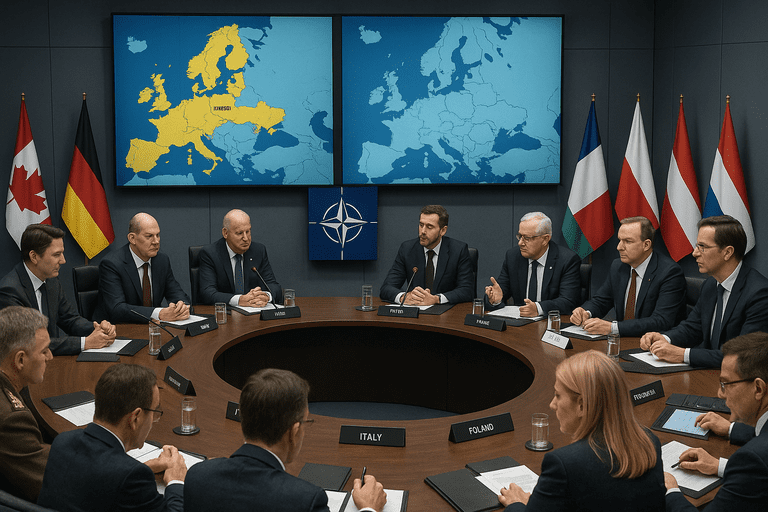The Trump administration has initiated a strategic realignment in U.S. defense policy, emphasizing increased European responsibility in supporting Ukraine and advancing NATO’s eastern expansion. This approach reflects a pragmatic reassessment of resource allocation and alliance dynamics.
U.S. Defense Secretary Pete Hegseth, during a recent NATO meeting in Brussels, articulated the administration’s position that European nations should assume the predominant role in providing both lethal and non-lethal aid to Ukraine. Hegseth stated, “Europe must provide the overwhelming share of future lethal and nonlethal aid to Ukraine.” This directive aligns with the administration’s broader strategy to recalibrate the distribution of defense responsibilities among NATO allies. (aljazeera.com)
In tandem with this policy shift, the U.S. has announced plans to withdraw troops from the Jasionka base in Poland, a key logistics hub established in 2022 to support Ukraine. The decision, attributed to cost-saving measures, signifies a transition of operational responsibilities to NATO forces, including troops from Norway, Germany, the UK, and Poland. Polish officials have affirmed that U.S. troops remain in the country and highlighted ongoing joint investments in permanent military infrastructure. (ft.com)
Further, the administration has proposed that NATO members increase their defense spending to 5% of GDP by 2032, with 3.5% allocated to national defense and 1.5% to related infrastructure. This proposal aims to bolster NATO’s preparedness in response to evolving security challenges. Currently, only 22 of 32 NATO members meet the existing 2% GDP target for defense spending, indicating a significant adjustment will be required. (apnews.com)
The administration’s stance also includes a reassessment of Ukraine’s potential NATO membership. Hegseth suggested that Ukraine should pursue a negotiated peace settlement supported by international troops, excluding the possibility of NATO membership. This approach aligns with Russian President Vladimir Putin’s position, which requires Ukraine to abandon its NATO ambitions. The administration’s policy reflects a strategic decision to prioritize diplomatic resolutions over military alliances. (apnews.com)
These policy adjustments present several operational considerations. The withdrawal of U.S. troops from strategic locations like Jasionka necessitates a seamless transition to ensure uninterrupted support for Ukraine. The proposed increase in defense spending requires substantial financial commitments from NATO members, many of whom have historically maintained lower defense budgets. Additionally, the exclusion of Ukraine from NATO membership may influence the geopolitical landscape and necessitate alternative security arrangements.
The administration’s strategy underscores a commitment to recalibrating defense responsibilities within the alliance, promoting equitable burden-sharing, and encouraging European allies to assume a more prominent role in regional security. While these initiatives involve complex logistical and diplomatic considerations, they represent a pragmatic approach to addressing contemporary security challenges. The successful implementation of these policies will depend on coordinated efforts, sustained commitment, and the development of robust frameworks to support the evolving defense landscape.
—
Ryan Mitchell reports on military funding, defense policy, and veteran support systems. He is a graduate of The Citadel and served as a civilian analyst for the Department of Defense before entering journalism. His reporting draws on firsthand knowledge of procurement systems, veterans’ programs, and the long-term cost of military readiness.



